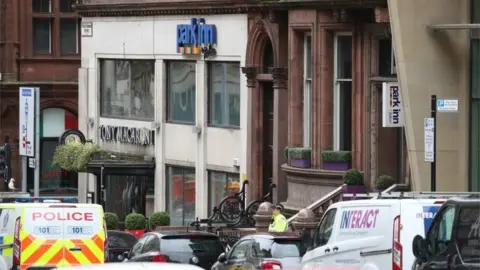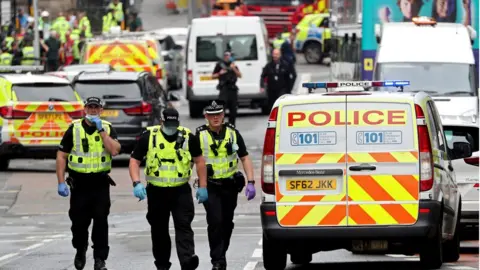Asylum seeker made 72 calls before hotel stabbings
 PA Media
PA MediaAn asylum seeker who stabbed six people in a Glasgow hotel had contacted the Home Office and other organisations more than 70 times before the attack.
Badreddin Abdalla Adam was among hundreds of asylum seekers moved into city hotels at the start of lockdown.
An internal Home Office evaluation said contact with the Home Office and two contractors, Mears and Migrant Help, "should have acted as a warning".
The Home Office said significant changes had now been made.
Adam was shot by police and died in the incident in the Park Inn hotel in June 2020.
In March 2020, the Home Office contractor Mears moved hundreds of asylum seekers from apartments into Glasgow hotels.
The company said there was a shortage of accommodation caused by the Covid pandemic and it wanted to minimise travel for staff, as well as ensuring asylum seekers could access welfare services.
 Police Scotland
Police ScotlandOn 26 June 2020, Badreddin Abdalla Adam - a Sudanese asylum seeker - stabbed six people in the Park Inn hotel, including three other asylum seekers, a police officer and two members of hotel staff.
He had contacted the Home Office, Mears, and Migrant Help 72 times about his health and accommodation in the period leading up to the attack.
The Home Office review, leaked to the BBC, also found Adam had complained to staff in the hotel and was in touch with the Home Office about an assisted voluntary return to his home country.
It said the inquiries individually, and cumulatively, were "not indicative of any elevated risk" - but the number of times he was in contact "should have acted as a warning" and there was "no joined-up view".
The review made several recommendations, including developing a system to identify patterns of contact which may cause concern, and ensuring hotel staff are given mental health awareness and de-escalation training.
The review said the rationale for moving asylum seekers, who had not been classed as vulnerable, into hotels appeared sound.
But it said the combined impact of previous trauma, being accommodated long-term in hotels, and the restrictions had "a significant impact" on their well-being.
 Reuters
ReutersThousands of asylum seekers are still living in hotels across the UK, including several cities in Scotland.
Refugees for Justice has been campaigning for an independent public inquiry into the Park Inn stabbings since 2020.
The organisation's Dylan Fotoohi described the Home Office review as a "shameful cover-up attempt."
He added: "Lessons have not been learned, there has been no meaningful investigation, the biased evaluation report by the Home Office has been kept hidden, and they have now expanded the exact same practice that led to these tragedies in Glasgow to other cities in Scotland. This is utterly unacceptable."
A Home Office spokesman said: "Due to the pandemic, the Home Office had to use an unprecedented number of hotels for asylum seekers, including in Glasgow.
"The use of hotels is unacceptable and we are working hard to find appropriate accommodation for asylum seekers, but local authorities must do all they can to help house people permanently.
"Since this horrific incident we have undertaken a number of significant changes to keep asylum seekers safe, including how we, our contractors and charities spot vulnerable individuals and provide them with wraparound support and appropriate accommodation.
"The Home Office has completed the majority of recommendations in the review which found that hotels in Glasgow were of a good standard, clean and well maintained.
"Our new plan for immigration, which is going through Parliament now, will fix the broken asylum system, enabling us to grant protection to those entitled to it and to remove those with no right to be here more quickly."
